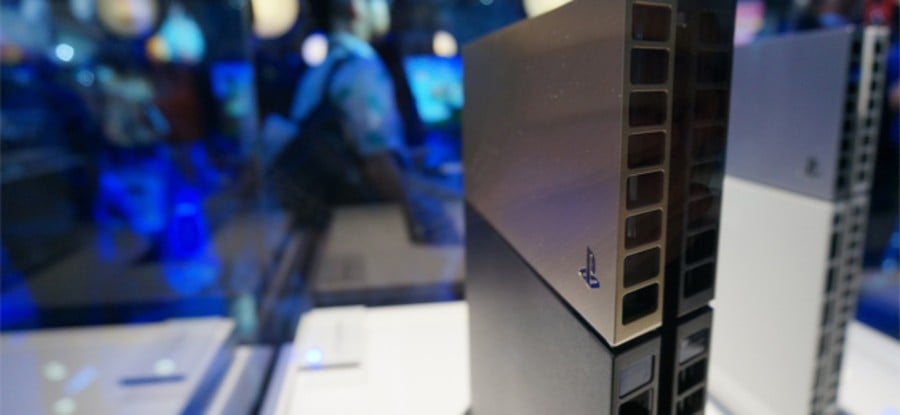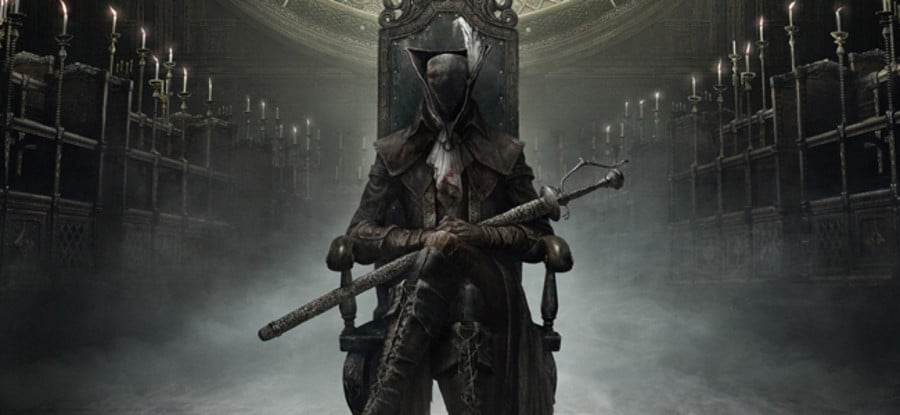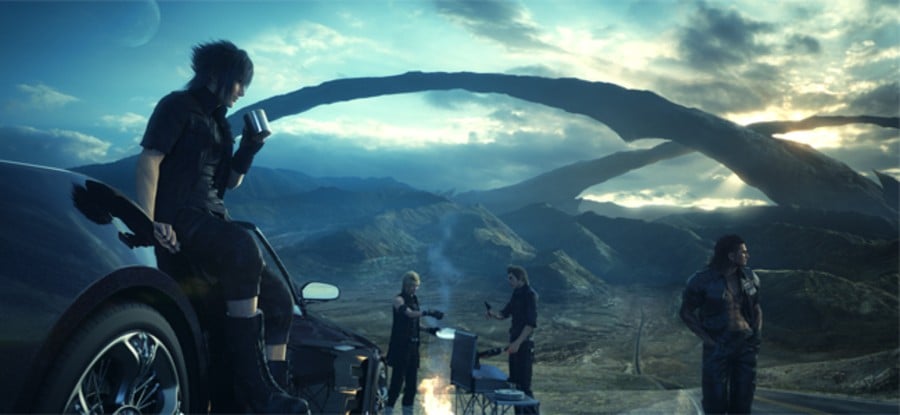
The PlayStation 4's been far from a flop in Japan since its launch last year, but it's failed to kick on in quite the way that we expected it to. The console's sold in fits and starts, with big releases like Dragon Quest Heroes and Metal Gear Solid V: The Phantom Pain prompting numbers to increase – only for them to shrink straight back down to the sorry status quo again. But platform holder Sony will be feeling confident this week, as all of the major Japanese publishers rally behind its box in an attempt to prolong the relevance of traditional gaming systems in the East.
And make no mistake about it, that's exactly what you're seeing. Square Enix alone has over ten titles in production for the new-gen format, and that's excluding the content coming from its handful of Western teams. But it's not alone: SEGA, Koei Tecmo, Bandai Namco, Capcom, Spike Chunsoft, and more all appeared during SCEJ's press conference earlier in the week – and they all had something to show for the firm's flagship format. Not everything was exclusive to the appliance – though that's starting to adapt – but the breadth of software was staggering.
 Watch on YouTube
Watch on YouTubeSubscribe to Push Square on YouTube167k
But what has changed? There were dark days during the PlayStation 3 era where it felt like the industry was all but done making consoles games, and yet there were over 100 upcoming PS4 titles for attendees to play in Tokyo this week. That number was, of course, eclipsed by smartphone releases – which also tended to have the biggest booths – but it represented an impressive increase over the 42 or so new-gen titles that Sony had to show this time last year. So why is a system that's faring so averagely domestically attracting so many big Japanese games?

Well, there are obvious observations to be made. The simplest of these is that the PS4 is on fire globally, and Eastern publishers are starting to realise that there's a market for their titles overseas. We talked about this exact subject with Bandai Namco's localisation team earlier in the week, and they told us that they always look at "every product and property on a worldwide level". The market for something like Sword Art Online may not be as large as Call of Duty, but it exists – and if a game can be sold in the West, then it's not wholly reliant on its domestic release to succeed.
A dominant PS4 may well be a good thing for the Japanese industry, then. When the Xbox 360 was at its peak, it muddied the waters a little, and with the complex nature of the PS3 architecture, Eastern developers found themselves a little unsure of where to bank their bets. This led to long, costly production cycles, and a handful of titles failing to find the right audience. But with the global market for Japanese games almost solely existing on Sony's machine, there's no longer a danger of that occurring again.
The other thing to note is Japan's discovery of middleware. Off-the-shelf engines such as Unreal Engine 4 are becoming more and more prevalent, with major titles like Dragon Quest XI and Street Fighter V employing the easy-to-use technology. This simple change is enabling developers to focus on making games rather than technology, with the Panta Rhei-powered Deep Down absent this year yet again – a reminder of the headaches that proprietary software can create. Heck, Capcom's upcoming squad shooter Resident Evil Umbrella Corps is running on the free-to-try Unity platform.

Sony seems to be back in a big way, too. Those up to speed on industry goings-on will know that Allan Becker left Sony Santa Monica in 2012 to join Japan Studio. He famously revealed in a Kotaku interview that the first-party firm was in a mess when he arrived, with 40 different projects in production, and many of them going nowhere. Since his return the developer's had a hand in titles such as Bloodborne, Soul Sacrifice, and Freedom Wars, while The Last Guardian and Gravity Rush have both been revived. We've heard on the grapevine that there's a big JRPG on the way, too.
Another positive for the PS4 is that the Japanese market is starting to open its mind to Western productions. The likes of Grand Theft Auto and Call of Duty have always been moderately successful in the East, but titles such as Star Wars Battlefront and Fallout 4 won awards at TGS 2015 this week. Interest in the Guerrilla Games developed Horizon: Zero Dawn also seemed surprisingly large at a panel overnight; with the right kind of marketing, the Monster Hunter comparisons could make the open world role-playing release a surprise success in the East.
And all of this is a good thing because the PS4 has proven time and time again that with the right software it will shift units domestically. The likes of Nioh and Yakuza 6 – both of which are being developed exclusively for the device – prove that publishers now see a future for the format in Japan, and as its install base grows, the number of software that it receives is only going to increase. It's never going to get the kind of unprecedented support that the PS2 received, but in terms of where the industry's at right now, TGS 2015 offered the very best that we could expect.
Are you happy to see Japanese console games rebound in such a big way, or were you disappointed with what was on display at TGS 2015 anyway? Which titles in particular have caught your eye, and which will you be giving a miss? Turn your attention to Tokyo in the comments section below.





Comments 14
Other than Horizon, which might be my overall mist anticipated game across all platforms, I can't wait to find out more bout Nioh, which is supposedly a Dark Soulsesque Samurai starring action game with more focus on magic. I vaguely recall the game being announced earlier, but I didn't know it was heading in this direction gameplay wise.
I also hope we'll get Yakuza Kiwami, but more importantly Yakuza 6. I'm afraid Sega will launch Yakuza 5 this winter on hardware that's pretty much dead in the west and then claim: "see, we told you nobody wants yakuza in the west". But Yakuza 5 is a great game from what I've seen and I can't wait to see what they'll do with the better hardware.
Funny you mention Desp Down, a title I discussed with a friend earlier this week. It wouldn't surprise me if the game has changed, or will change, engines, because things aren't looking good. That game should've been the title to win gamers back for Capcom, but it looks like it fell prey to the usual pitfalls in Japanese game development where 10 subcontractors (small studios, not people) are working on tons of different assets which will never be puzzled together and will be just added to the already colossal development cost.
Some nice info for people who feel the PS4 is performing worse than they expected and why the TGS is so centered around mobile gaming. Mobile gaming is huge in entire Asia, but nothing compares to Japan. Games are made to be played in short bursts and the pay-2-win model or "buying energy or credits" are more part of their gaming culture and pretty much accepted. But how does this translate the financial side? In South Korea mobile games are pretty popular and the average amount of money a popular game will squeeze out of a customer is about $5. The exact same games in Japan however make more than $50 per customer on average, which explains why the market is bombarded with these games; those short little bursts of gameplay played while commuting are so profitable that you'd almost be a fool to invest in the high risk- (relatively) low reward console games.
Still some developers see the benefit in console games and in Japan it works the other way around than it does here: a console game can strengthen the brand and can support mobile games where the real money is to be made. So I expect Japanse developers and publishers will still be around for quite some time, also in the console space, but more and more will they start using cheaper middleware. I hope they won't lose their uniqueness this way and I sincerely hope console games won't be an afterthought, like we saw just a little while ago with companion apps. But last year's TGS already made me cautiously optimistic, but after this event I'm pretty sure the Japanese devs and pubs will find a good balance between mobile and console gaming and they'll overcome their mostly technical shortcomings.
Tl:dr ... How on earth did we lose from Japan?! How is that even possible?! Come on you guys, I need this!!!
I'm a Nintendo fan, I really love everything about Mario's company, that said, the reality is PS4 amazing perfomance is really good for gamers in general. Xbox can't suceed because divide the userbase and creates a problem for japanese games (which in my opinion are the very best)
Well said Frank, good to see the runaway success of the PS4 have ripple effects in the east.
It's also great to see western titles find an audience in Japan,.......the Japanese more or less created the modern gaming industry, but their lax efforts during the last decade means that they could learn a thing or two from the Bethesda / Naughty Dog / Rockstar / Blizzards of the world.
Ofcourse Horizon: Zero Dawn will be a big hit in the east. Although it is a western style RPG open world, it has been designed to incorporate features that would appeal to the east and JRPG fans as well.
It's 'Monster Hunter', it's a female with a bow, it's dinosaurs, it's robots that act like real creatures, it's transformers and it has light RPG elements for JRPG fans. All those features appeal to the east a well as to the west. The only things missing are the big manga eyes on little miss cutey pie, the big spikey obsession with hair and the depressingly over-sentimental story line which would all stifle sales in the west.
It's going to be an awesome game and sell like hot cakes all over the world.
@justerthought Yeah, because Japan only plays manga styled games. Psh. Ba-dum-boom!
You forgot to mention DOA Extreme 3 and Summer Lesson, the two titles that will guarantee the success of Playstation VR in Japan
It's got some great games on the way, but I still don't see PS4 hardware sales ever being consistently great in Japan. As has been the trend, it'll have a great week here or there but that's it.
Sony's competition in Japan (as far as the PS4 goes) is not Nintendo nor Microsoft, but the absurdly fast growing and over taking Mobile Market.
@Warruz
No question Sony needs to be concerned about the mobile market. Nintendo can get by on first party games alone and even if it never sold more than 10 mil as far as home consoles or handhelds again, it could still find a way to survive. Sony needs third parties, however, and with more and more Japanese developers looking to mobile, it's possible in a few years time that Sony faces potentially the same irrelevance in Japan as MS.
Pretty bold to say in just a "few" years that Sony will be as irrelevant as Microsoft in Japan. That is one statement I cannot get behind.
@SonyInfinity
I'm not saying it will happen, just that it wouldn't shock given the rise of mobile and the increasing number of important third parties, which are critical to Sony's success, who seem to be jumping on that bandwagon.
@Boerewors Thanks for sharing this information.
@Dr-M
Don't thank me, thank Jack Daniels!
@Gamer83 So because they make some mobile games they can't continue to produce AAA titles? Is there an unwritten rule that if your development company starts developing mobile games, they can no longer create new AAA games?
Show Comments
Leave A Comment
Hold on there, you need to login to post a comment...